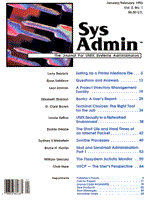
Listing 2
1: #
2: # Project Directory and Scratch Directory Management Script
3: # Written by Leor Zolman, 10/92
4: #
5: # For inclusion in .profile under sh or ksh shells.
6: # This code is generalized, and will work as shown under both shells,
7: # though slightly better performance may be obtained under ksh by changing
8: # invocations of pwd into interpolations of the $PWD environment variable.
9: #
10:
11: #### Project directory management: #########################################
12:
13: PROJDIR=$HOME/.Proj # Master directory for all project definitions
14: export PROJDIR # (required for use by showp and shows scripts)
15: NPROJDIRS=12 # Maximum number of project directories
16: SCRATCHDIRS="x y z" # scratchpad directory memory variables
17: SHOWCHANGE=Y # Y to show result of dir change, else N (set to N
18: # if your prompt already displays working directory)
19: #
20: # Master project directory control function (called by p# functions below)
21: # usages:
22: # p proj# dir - add given directory (. for current) to project list
23: # p proj# - change directory to given project
24: # p proj# done - drop given project from project list
25: #
26:
27: showdir() { [ "$SHOWCHANGE" = Y ] && pwd; return 0; } # show new dir, if desired
28:
29: p()
30: {
31: [ $# -eq 0 ] && echo "p() shell function invoked incorrectly." && return
32: [ $1 -ge 1 ] 2>/dev/null && [ $1 -le $NPROJDIRS ] 2>/dev/null &&
33: {
34: if [ $# -eq 2 ]; then
35: if [ $2 = done -a -f $PROJDIR/Proj$1 ]; then
36: rm $PROJDIR/Proj$1
37: eval "unset proj$1"
38: return
39: fi
40: target=$2
41: [ $2 = "." ] && target=`pwd`
42: echo $target >$PROJDIR/Proj$1
43: # Define and export environment variable proj#:
44: eval "proj$1=$target; export proj$1"
45: else
46: if [ ! -f $PROJDIR/Proj$1 ]; then
47: echo "No Project #$1 defined."
48: return
49: fi
50: touch $PROJDIR/Proj$1
51: cd `cat $PROJDIR/Proj$1`
52: showdir
53: fi
54: return
55: }
56: echo "p() function called with invalid project register number: $1"
57: }
58:
59: # Create project directory, if it does not already exist:
60: [ ! -d $HOME/.Proj ] && mkdir $HOME/.Proj
61:
62: #
63: # Define all quick-access functions p#(), and define simple
64: # environment variables proj# (for active projects only) by
65: # reading in their values from the .Proj directory:
66: #
67:
68: i=1
69: while [ $i -le $NPROJDIRS ]
70: do
71: # Define quick-access function p#():
72: eval "p$i() { p $i "'$*'"; }"
73:
74: # if project active, define environment variable proj#:
75: [ -f $PROJDIR/Proj$i ] &&
76: eval "proj$i=`cat $PROJDIR/Proj$i`; export proj$i"
77:
78: i=`expr $i + 1`
79: done
80:
81:
82: #### scratchpad directory shorthand function/variable definitions: #########
83:
84: for X in $SCRATCHDIRS
85: do
86: # Define assignment function setX() for each X in SCRATCHLIST (each such
87: # function defines a directory and a corresponding environment variable)
88: eval "set$X() { $X=\`pwd\`; echo \$$X >$PROJDIR/${X}dir; }"
89:
90: # Define function to undefine a directory and corresponding env. var:
91: eval "unset$X() { unset $X; rm $PROJDIR/${X}dir; }"
92:
93: # Define quick-access function goX() for each X in SCRATCHLIST:
94: eval "go$X() {
95: [ \"\$$X\" != \"\" ] && cd \$$X && touch $PROJDIR/${X}dir \
96: && showdir && return
97: echo directory $X undefined.; }"
98:
99: # Define environment variable X for each *defined* X in SCRATCHLIST:
100: [ -f $PROJDIR/${X}dir ] && read $X < $PROJDIR/${X}dir
101:done
|